Almost There: Myrna Loy in "Test Pilot"
 Wednesday, September 16, 2020 at 2:00AM
Wednesday, September 16, 2020 at 2:00AM 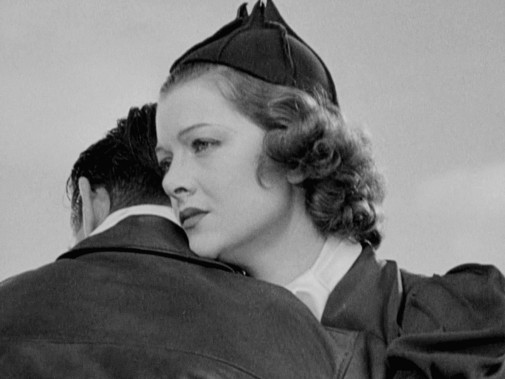
Myrna Loy's an interesting case as far as the Oscars are concerned. She was a great star, a charming performer with a magnetic screen presence, and even appeared in more than one Best Picture winner. It's easy to imagine that such a person would be a shoo-in for an Academy Award nomination at some point in their career, but Loy was never that lucky. Of the many times she came close, we're here to discuss Test Pilot. This Victor Fleming-directed romantic drama nabbed three nods back in 1938. Among them was a Best Picture citation, though no love was shown to the movie's actors…
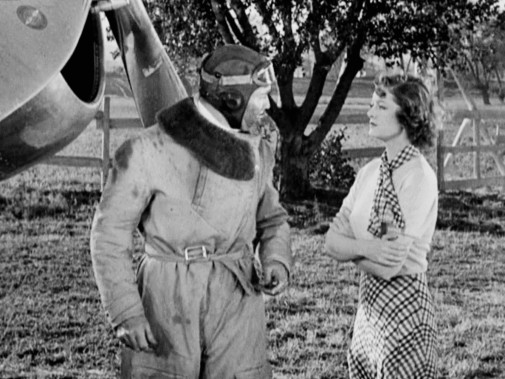
Inspired by Lieutenant Commander Frank Wead's real-life experiences, Test Pilot tells the story of an aviator named Jim Lane, played with dashing charisma by Clark Gable. One day, during a reckless flight, he's forced to land (or crash) on a Kansas farm where he crosses paths with Myrna Loy's Ann "Thursday" Barton. After spending what seems to be less than 24 hours together, they fall in love like all attractive movie stars in Old Hollywood romances do. Still, the road to a happy ending isn't a straight line, not when Howard Hawks is among the screenwriters.
Despite their obvious attraction, Jim and Ann are stubborn people, unwilling to show weakness, not even to the person they claim to love. At first, he leaves her and, to show her paramour that her heart's unbroken, she gets engaged to a local sweetheart. Of course, such obstinance won't be long-lived and they eventually fall into matrimony with each other. Still, at a story beat when many movies would end, Test Pilot's only getting started. After the wedding, Ann finds that the life of a test pilot's wife is one of constant anxiety.
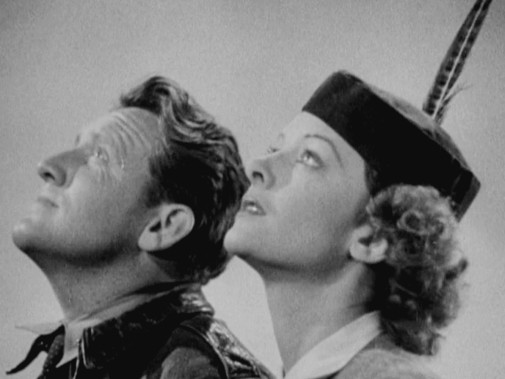
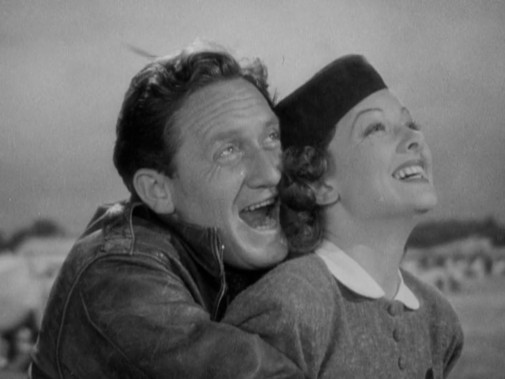
Many times, we're made to watch her looking on her beloved as he flies up in the sky inside experimental deathtraps that often claim lives as they crash and burn. In this, she's joined by Jim's best friend, a mechanic named Gunner who's played by Spencer Tracy with his usual stoic fashion. Bound by their love for a reckless man, the two form an odd bond made of shared stress and debilitating fear. I won't spoil how the movie ends, but Death does show its face a couple of times, and Loy' Ann is inevitably driven to copious tears.
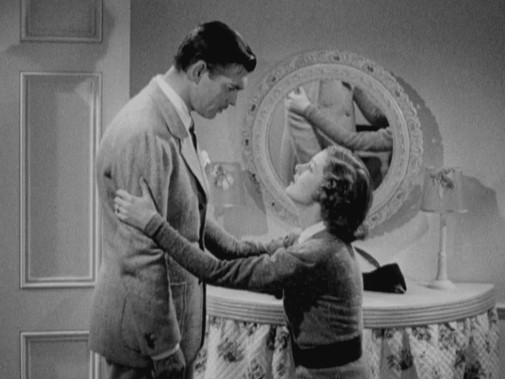
On paper, the role of Ann isn't very complex. She falls in love and she is afraid for her romantic interest, a simple arc easily illustrated without a lot of tonal shifting. Mostly, the actress has to look beautiful and in love, able to cry at important moments. The genius of Loy is how she finds variation inside the role, building an interesting character out of a simplistic archetype. She finds humanity in the stock part of the bereaved long-suffering wife of a "great man".
Mostly, the actress does this by playing every scene at two levels, what Ann feels and what Ann shows. It's a smart strategy that gives added meaning to the text she's given. There's always a palimpsestic relationship between what goes on inside the character's head and what Loy outwardly performs.
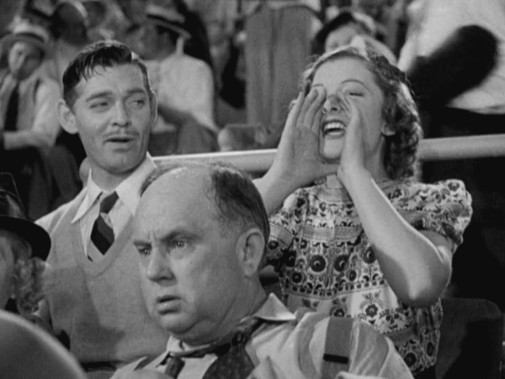
Nose in the air, defiant and confident, Loy walks into the picture as if she owns the whole world. There's an arresting abrasiveness to her manner, a touch of sourness that helps us better appreciate the instant attraction between our romantic leads. In Loy's hands, Ann's a woman who's unwilling to show vulnerability, be it weeping sadness or the preciousness of blooming love. She likes Gable's Jim but she won't let him see just how much. It takes a shocking experience, first flying adventure, for her mask to slip and for the actress to surrender completely to elation.
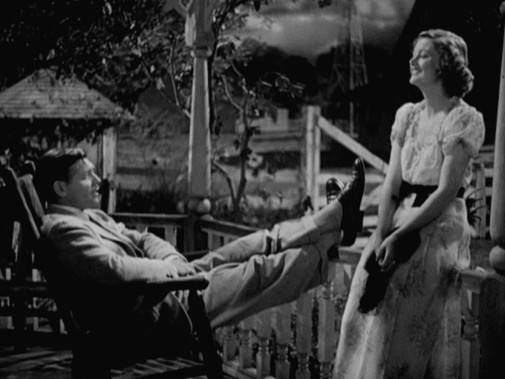
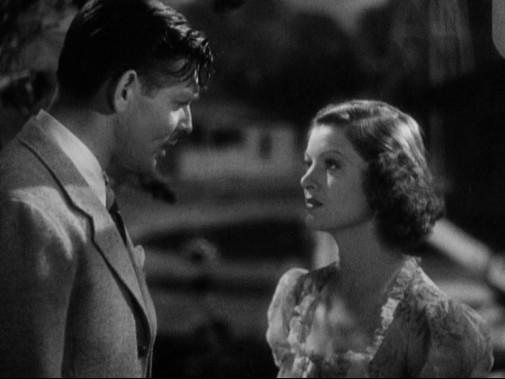
Later on, when Jim's telling Ann of their impending separation, Loy plays the moment with obstinance, hiding this woman's heart like an animal hides their soft belly from incoming danger. We understand the character's deep feelings by how visibly she fights against them, almost as if Ann's trying to convince herself of the things she's telling Jim. Still, we can always see what's hiding behind the filigreed wall of her indifference. Ann doesn't want him to leave but she'll not give Jim the pleasure of witnessing how her heart breaks for him.
Acting these contradictions could be an effortful task, but Loy makes it look easy, further intertwining suggestions of forbidden Pre-Code-esque naughtiness and jolly humor between Ann's performative rejection.
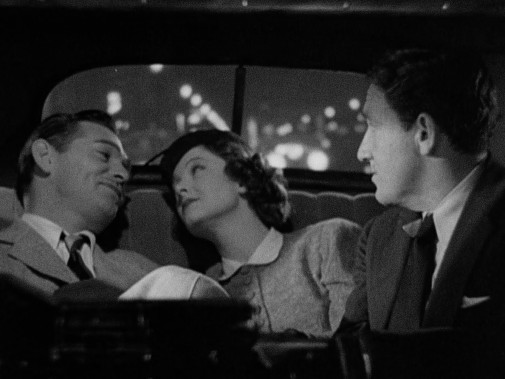
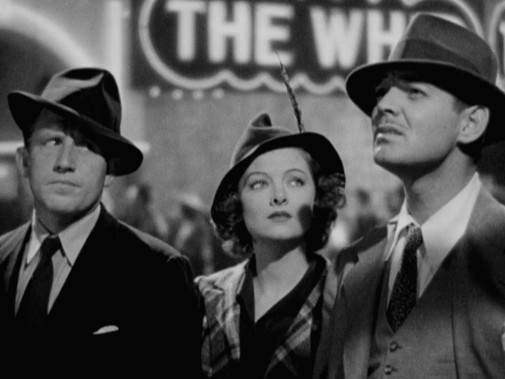
With the advent of marriage and the picture's second act, Loy gets less to do, but her transition from romantic comedy to sincere melodrama is seamless. From the start, there's a cloud of sadness at the edges of her marital glee, an apprehension that only manifests completely when Gable's away and Loy can share scenes with Tracy alone. Sometimes, the movie even finds little morsels of quiet comradery going on between wife and best friend when the hero's in the scene. There's a great moment when Loy hugs Gable and looks over his shoulder towards Tracy. In a simple exchange of loaded looks, a wave of sorrow washes over the film, her fear mirrored in his subtle reaction while the man they both love remains oblivious.
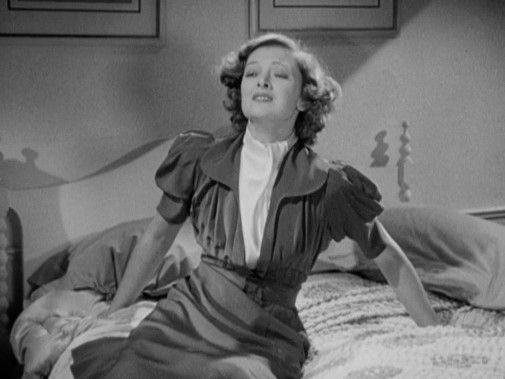
In Test Pilot, Myrna Loy's performance's a crescendo of dramatic tones disrupting light-hearted romance and her final passages are stupendous thanks to that built-up of emotion. Her devastation feels earned, tearfully explosive but organic nonetheless. Unfortunately, that wasn't enough to convince AMPAS, who chose five other actresses over her. In the Academy's defense, their selection is impressive, even without Loy. The nominees were Fay Bainter in White Banners, Bette Davis in Jezebel, Norma Shearer in Marie Antoinette, Margaret Sullavan in Three Comrades, and Wendy Hiller in Pygmalion. Davis won her second statue that year, while Loy would be Oscarless until she received an honorary trophy in 1991.
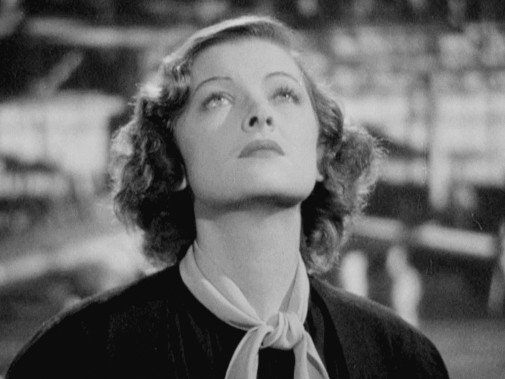
If you're a fan of Myrna Loy, for what performances do you think she should have earned Oscar nominations?



Reader Comments (15)
Myna Loy is unfortunately the patron saint of almost there when it comes to the academy. The two films which I would be most pushed to reward her a nomination with the academy would be Thin Man and Best Years of Our Lives. The latter is an especially bad oversight given the academy's love for the film that just didn't spread into the female categories. Both Loy and Wright would've made great nominees in a year where the best female acting was largely ignored due to genre (i.e, Hayworth, Gilda) or being international (i,e. Magnani, Rome Open City)
I adore Myrna Loy in The Best Years of Our Lives
In this day and age, the Internet provides us an overwhelming sample of video of soldiers arriving home to loved ones. Yet, none of these can surpass the exquisite emotion of Milly Stephenson welcoming her beloved husband home.
Milly is in the dining room when she hears the door. She calls to her adult children to see who is visiting. They don’t answer. She is puzzled and then suspects who the unexpected visitor may be. She catches her breath and steadies her nerves. She steps into the hallway. The camera is placed at the far end of the hall so we can see the physical effect of the experience.
Milly struggles with conflicting emotions as she tentatively approaches the man she hasn’t seen in years. She fully embraces her long absent husband, and we see her defenses fall away. The loss, the passion and the joy flash across her face. Loy provides us one of the great, profoundly moving scenes in film history.
Loy & Oscar is also a case of bad timing. In 1934, she was in fifth place for The Thin Man, good enough for an Oscar nomination in most years, but that was the last year they did less than five nominees, and thus her best shot disappeared.
That tenth (or third-from-last) image. I know I’m supposed to focus on the leads, but no one can wear a hat like Spencer Tracy.
I love Myrna Loy and it's a shame she was never nominated for an Oscar. Agree that she should have been nominated for The Best Years of Our Lives and I would argue a case for her winning.
Yeah, Myrna Loy would probably have had to die consumptively onscreen or wear bad teeth and a fake scar or something to get a nomination. She was like Cary Grant, she just made it all look so easy and gave off charisma without even trying. Oscar likes to make you work for your nomination I guess.
The two mentioned performances were her most likely shots. The Thin Man came out in the wrong year for her, since Claudette Colbert seemed to land the breezy comedy nom that year. And I suspect that she fell in that dread gray zone between Supporting and Lead for The Best Years of Our Lives.
Eoin-I actually think that Virginia Mayo was the best female performance in Best Years (and another case where someone was a big name but never got acknowledged by Oscar).
Myrna is on my all-time list. I agree that she is the victim of bad timing when it comes to AMPAS. She's sublime in The Best Years of Our Lives. I think what happened there was that there was confusion if it was lead or supporting with her role. I think she should have been nominated in supporting and possible have won. She's also terrific in From the Terrace as Paul Newman's alcoholic mom. The role is very short, but a nomination would have been deserved.
She's so damn good in The Thin Man. Actually, anything with William Powell. Actually, everything.
I'm a huge fan but poor Myrna suffered from the same curse as Ida Lupino, Edward G. Robinson, Joseph Cotton and Fred MacMurray among others, when you are consistently excellent it becomes expected and much harder to be singled out.
Test Pilot didn't do much for me in terms of finding it anything other than an enjoyable un-extraordinary star vehicle for its three leads. All of them share great chemistry with each other both individually and as a group but all three have had better showcases. Your insights into the performance were great though. I'll have to give the film another look with an eye to her work.
While I don't see her as a miss in this particular year there were plenty places where she was overlooked but worthy.
The top five of those would be:
1934-The Thin Man-Incredible that they nominated William Powell and not her! He was completely deserving but how the hell did they miss her?
1939-The Rains Came-A bit of a change of pace role for her as the hedonistic Lady Edwina Esketh who is changed by her love for Tyrone Power. She made the film on loanout to 20th Century Fox so they probably didn't push her like they would have their own stars.
1946-The Best Years of Our Lives-I think this is universally considered the biggest miss of her career. It might have been category confusion that screwed her over. Myrna was still very much a leading star at the time but as important as Millie is in the film the thrust of the story is the three men and Millie disappears for big segments so she would have made more sense in supporting. However the studio may not have submitted her there and she was squeezed out of lead by actresses with more screen time.
1948-Mr. Blandings Builds His Dream House-If only for the scene where she describes the colors she wants the rooms painted but the whole performance is a sly comic delight.
1958-Lonelyhearts-As the broken alcoholic wife locked in a soul killing marriage to Robert Ryan she's exemplary.
Since we're looking at 1938 here, wasn't the Smackdown supposed to go up on Monday? Did I miss a reschedule announcement? Hopefully soon!
@ Eoin Daly and John T
For me, I prefer Cathy O'Donnell, after Myrna Loy, as the most deserving actress from The Best Years of Our Lives for a nomination. Her performance is a very calculated move by director William Wyler who delights in setting us up by playing to our prejudices and then dropping the hammer.
Wyler cast O'Donnell, then an aspiring actress working as a secretary on the studio lot, in the role of Wilma Cameron, the high school sweetheart of returning paraplegic Homer Parrish. Wilma, quite literally the girl next door, serves to be a visual contrast of Homer's youthful innocence and the damaged man he has become.
O'Donnell is fresh faced, make up free. She wears prints that could appear on a picnic tablecloth without raising an eyebrow. For Homer's homecoming, the camera focuses on Homer's reaction to seeing his girl and his inability to put the hooks that replaced his arms around her. Being the male dominated society we are, we don't even consider how the reunion feels for Wilma. Mid film, Wilma has a nice speech about her feelings. She professes her faithful love for Homer as a man. The camera still leads our eye to how Homer reacts as he listens to her. Our hearts are with the man struggling with raging insecurity.
Wyler's specific decision to focus our eye on Homer allows Harold Russell to give a tremendously sympathetic performance that won an Oscar. It also permits O'Donnell to devastate the audience emotionally at the end of the film.
The cast gathers for Homer and Wilma's wedding. While the traditional service in the family living room plays out, Wyler creates a riveting, tense sequence. Will Homer be able to stand and use his hooks to take Wilma's hand in marriage? The simple, well known words of the ceremony take on a subtext that is an emotional pull. The placing of the wedding ring on Wilma's finger is particularly fraught with tension as the camera creates a can he or can't he moment? The entire cast watches breathlessly as Homer clutches the ring in his hook before attempting the task. Well, everyone but Wilma.
As the assembled guests respond to the discussion of hands in the wedding vows and Homer's situation in performing the traditional role, O'Donnell's face is blissful. Wyler takes several silent pauses to remind us that this is Wilma's wedding day. In a tight shot, we see Wilma's hand take Homer's hook as she says her vows. The physical action is loving and assured. While even the minister cannot help himself but to steal a glance at Homer's hooks,
O'Donnell only sees Homer. Her eyes meet his. We suddenly realize that we have ignored this woman's pain and loss which are different but equal to Homer's. Her life has changed forever as well. And she meets that obstacle head on. O'Donnell owns the last sequence of The Best Years of Our Lives. It is her grit that gives resolve to the audience to see disabled war veterans as men. Wilma does.
I have to admit that I was late to the Myrna Loy party. In comparison to many of her contemporaries, I found her performances too subdued and outright dull.
I don't remember which film finally converted me to a major fan, but now I see the perfect comedic timing, the subtle displays of intelligence and feeling, and how much she does with each character without needing to be showy. I can't think of a film where I could accuse her of chewing the scenery.
Her incredible rapport with William Powell makes them the best of the great screen teams for me. I would have placed her second at the Oscars for The Thin Man. Other than the last of the series, I really enjoy each of the films for their pitch perfect banter and chemistry.
I think she could have been "almost there" for From The Terrace as a supporting nominee. But it's tough to get noticed in a Newman-Woodward film.
Loy, & her favorite film Test Pilot, have a different meaning for me. From my 1st sight of Nora Charles glamorously face planting, tossing it off with a quip & then lining up martinis in The Thin Man, she was my gay diva. Over a decade later she published her memoirs, where I learned for the 1st time our fathers had died when we were both age 12. Loy wrote about the impact his death had on her decades later when she was on the verge of a breakdown. Her character Ann in TP has 2 unique moments where she articulates thoughts about death & mortality I have never heard elsewhere but totally relate to, tossing & turning @ night, with the clock ticking, "'still living, still living", & later, after a death, screaming tearfully @ her beloved, "Why couldn't it have been you?!" There are many great actors, but Loy will always be the only one to serve as personal grief counselor, on screen & off. Screw the Oscars.
Such an inspiring story. Thanks for sharing with us. Free fornite v-bucks
What a nuanced analysis of Myrna Loy’s performance in Test Pilot! Her ability to convey inner turmoil through subtle glances and gestures elevates Ann’s character beyond the script’s simplicity. It’s a shame the Oscars overlooked her brilliance.
P.S. If you enjoy deep dives like this, you might find iq test free intriguing—it offers assessments that sharpen analytical thinking.